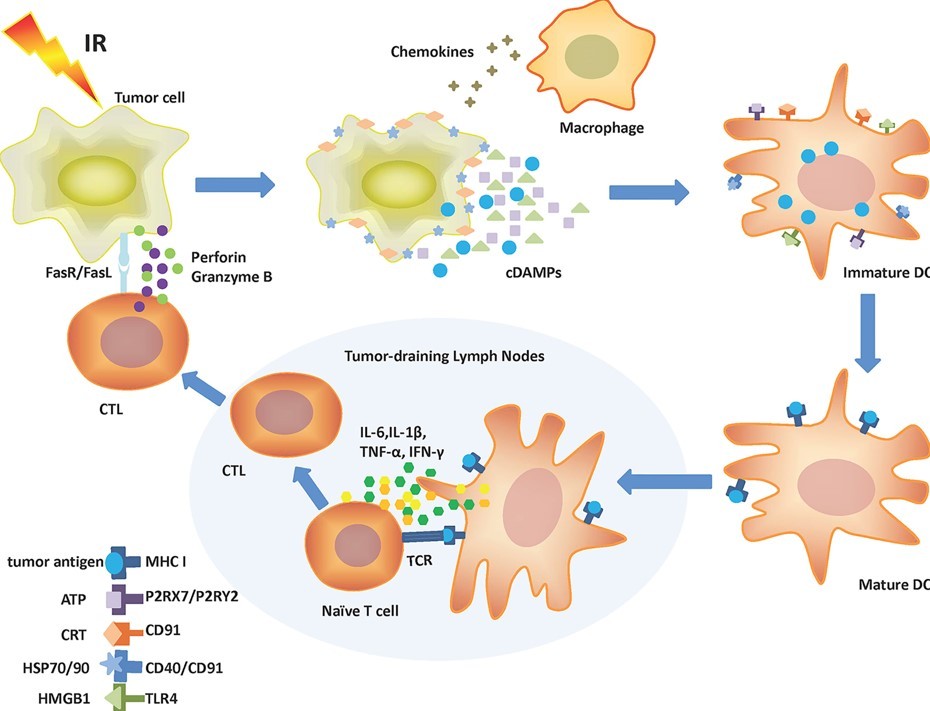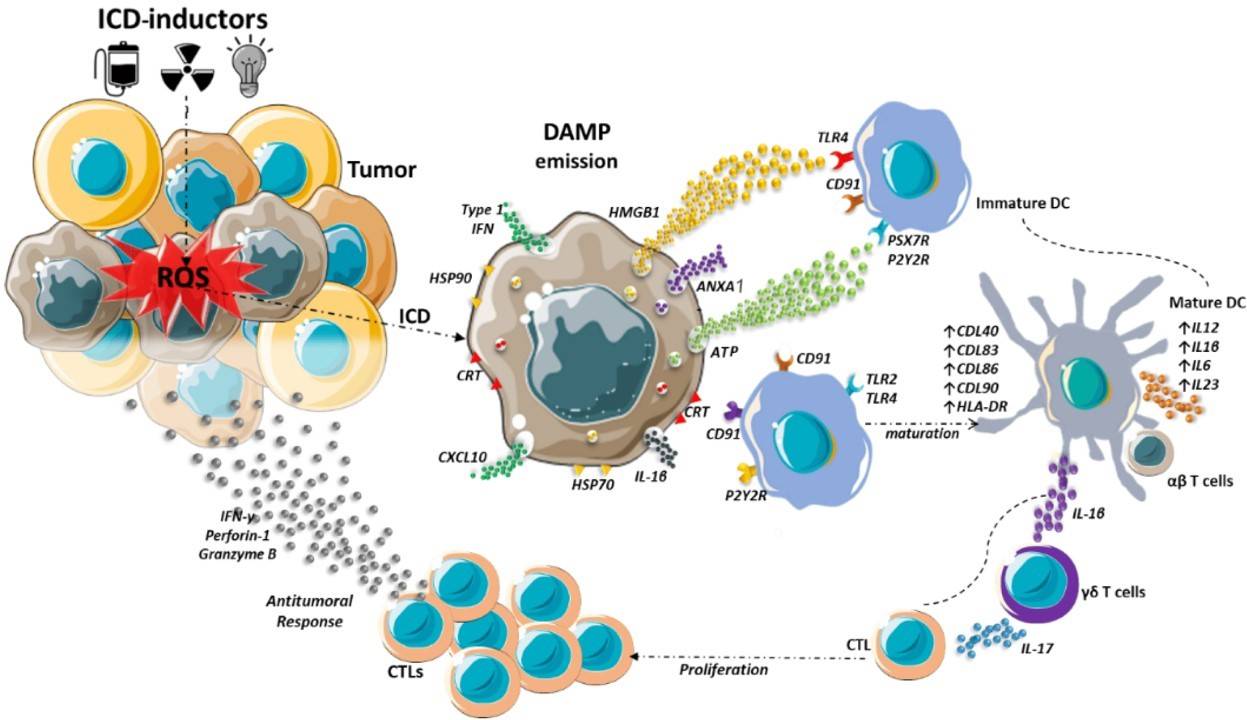lmmunogenic Cell Death Inducer Development Service for Cancer Immunotherapy
Promoting Immunogenic Cell Death to Enhance Efficacy of Cancer Immunotherapy
Increasing the immunogenicity of cancer cells through the induction of immunogenic cell death (ICD) is emerging as an effective way to boost the efficacy of cancer immunotherapy. Despite its success with certain types of cancer, immunotherapy has unfortunately shown limited responsiveness in many kinds of solid tumors. Using ICD inducers to stimulate a specific immune response, however, could prove to be a significant breakthrough in cancer treatment.
 Fig.1 The mechanism of ICD induced by lionizing radiation.1,3
Fig.1 The mechanism of ICD induced by lionizing radiation.1,3
Our Immunogenic Cell Death Inducer Development Service for Cancer Immunotherapy: Sensitive! Rapid! Robust!
When ICD inducers are included in an appropriate microenvironment, they have the ability to increase the immunogenic of tumor cells to stimulate the immune system and initiate targeted immune responses. Creative Biolabs provides an immunogenic cell death inducer development service for cancer immunotherapy that focuses on developing various ICD inducers for enhancing cancer immunotherapy. We provide a wide range of developing services targeting various ICD inducers such as microbial, chemical, and physical. Every inducer has its unique properties, thus we simultaneously custom-develop solutions to support global customers' diverse projects. In addition, we also supply multiple types of ICD biomarkers and related detection methods to give convenience in examining inducers' effectiveness and screening the most effective inducer. Together with our robust development platform and experienced research team, we have great confidence in answering every customer with a high-quality outcome.
 Fig.2 The activation of the adaptive immune system after the tumor's ICD.2,3
Fig.2 The activation of the adaptive immune system after the tumor's ICD.2,3
Promising Inducers Development for Cancer Immunotherapy
|
Promising Inducers
|
Types
|
Promising Inducers
|
Types
|
|
Microbial ICD inducer
|
Obligate intracellular pathogens, Oncolytic virus
|
Chemotherapeutic ICD inducers (CT)
|
Non-metallic chemotherapeutic agents
|
|
Photodynamic therapeutic ICD inducer (PDT)
|
Metallic chemotherapeutic agents, Organic photosensitizers, Inorganic photosensitizers, Organic-inorganic hybrid materials
|
Photothermal therapeutic ICD inducer (PTT)
|
Organic photosensitizers, inorganic photosensitizers, and organic-inorganic hybrid materials
|
|
Radiation therapeutic ICD inducer (RT)
|
X-ray, radioisotopes
|
Synergistic therapeutic ICD inducer (Syn-T)
|
|
|
Magnetic hyperthermia therapeutic ICD inducer (MHT)
|
|
Sonodynamic therapeutic ICD inducer (SDT)
|
|
Hot ICD Biomarkers for Inducer Development
 Fig.3 Hot ICD biomarkers for inducer development.
Fig.3 Hot ICD biomarkers for inducer development.
ICD Biomarkers Detection Approaches at Creative Biolabs
Various detection methods possess their unique application ranges. To effectively verify and screen the desirable inducers, we provide a set of well-developed ICD biomarkers detection approaches to advance global customers' ICD inducer development projects:
As a leading company in cancer immunotherapy development, Creative Biolabs is dedicated to discovering effective approaches to aid in cancer treatment. If you want to know more details about our immunogenic cell death inducer development service for cancer immunotherapy, please don't hesitate to contact us.
References
-
Zhu, Mengqin, et al. "Immunogenic cell death induction by ionizing radiation." Frontiers in Immunology 12 (2021): 705361.
-
Rodrigues, Mosar Corrêa, et al. "An overview on immunogenic cell death in cancer biology and therapy." Pharmaceutics 14.8 (2022): 1564.
-
Distributed under Open Access license CC BY 4.0, without modification.
For Research Use Only | Not For Clinical Use


 Fig.1 The mechanism of ICD induced by lionizing radiation.1,3
Fig.1 The mechanism of ICD induced by lionizing radiation.1,3
 Fig.2 The activation of the adaptive immune system after the tumor's ICD.2,3
Fig.2 The activation of the adaptive immune system after the tumor's ICD.2,3
 Fig.3 Hot ICD biomarkers for inducer development.
Fig.3 Hot ICD biomarkers for inducer development.
 Download our brochure
Download our brochure